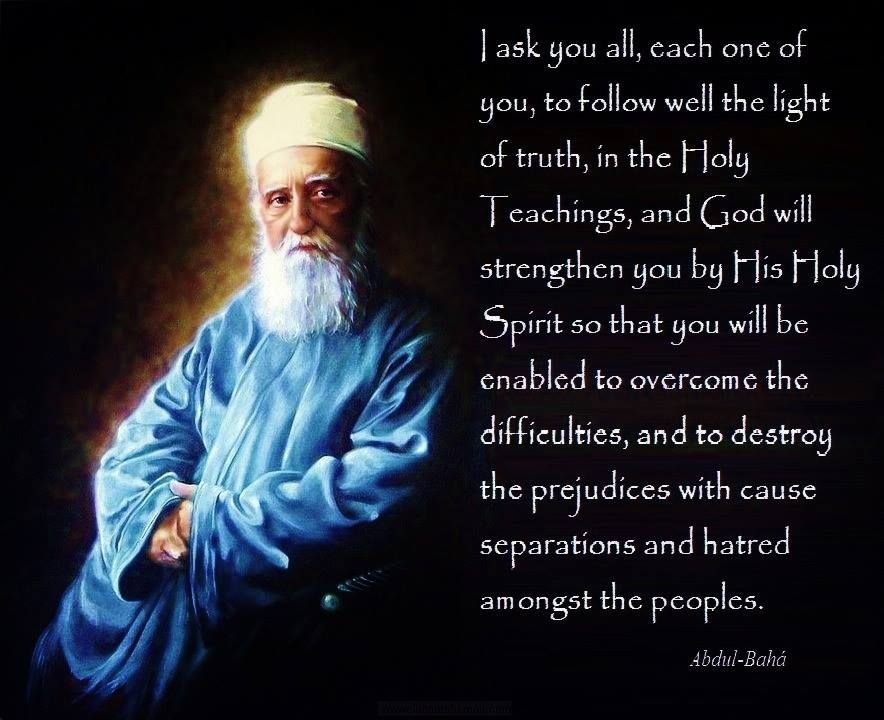In the cacophony of existence, individuals often find themselves traversing the labyrinth of life, yearning for clarity and purpose. The journey of discovering one’s spiritual path can be likened to seeking a rare jewel in the vast expanse of an uncharted ocean. For many, this quest leads to the teachings of the Bahá’í Faith, a faith that seeks to harmonize the human experience with the divine. The allure of Bahá’í beliefs lies in their profoundly inclusive nature, weaving a tapestry that embraces humanity’s diverse experiences while outlining a universal vision for peace and unity.
The fundamental tenets of Bahá’í teachings compel adherents to embrace the oneness of humanity. This principle, akin to a golden thread running through the rich fabric of human history, invites individuals to recognize the interconnectedness of all people, transcending the barriers of race, nationality, and creed. The Bahá’í Faith, through its teachings, presents a glorious mosaic of humanity where each individual represents a unique piece of the divine puzzle. This vision resonates deeply in a world grappling with the tumult of division and strife.
In contemplating the distinctive appeal of the Bahá’í Faith, one is entranced by the metaphor of a garden. Each flower represents a different culture, perspective, or belief system; together, they create a vibrant ecosystem that flourishes under the nurturing rays of a common sun. This garden metaphor encapsulates the essence of Bahá’í teachings, which advocate for respectful dialogue and collaboration among various faiths, akin to diverse flora coexisting harmoniously. Just as a garden requires diligent care, so too does the cultivation of unity among humanity necessitate mutual appreciation and understanding.
An intrinsic element of the Bahá’í teachings is the concept of progressive revelation. This transformative idea posits that religious truth is not static but rather unfolds like the petals of a flower, offering deeper insights over time. Each Manifestation of God, from Moses to Muhammad to Bahá’u’lláh, is perceived as a gardener tending to humanity’s spiritual garden, sowing seeds of wisdom suited to the needs of their time. This perspective fosters an appreciation for the continuum of religious thought, illuminating the commonalities among diverse faiths while honoring their unique contributions.
Moreover, the emphasis on education and the empowerment of individuals under the Bahá’í teachings serves as a catalyst for social transformation. Knowledge is likened to light—illuminating the darkest corners of ignorance and prejudice. The belief that education is a fundamental right for all is not merely an ideological stance but a call to action, providing individuals, regardless of gender or background, the tools needed to participate meaningfully in the tapestry of society. Such an ethos inspires a collective movement towards social equity and justice.
The Bahá’í approach to the family unit further encapsulates its teachings. The family is often regarded as the nucleus of society, where love and understanding can flourish. Bahá’í teachings advocate for the equality of men and women, positing that both are essential in fostering a nurturing environment for future generations. This perspective is vital; it seeks to dismantle the gender stereotypes that have for too long shackled societal progress, allowing families to blossom into fulfilling and nurturing spaces.
Additionally, the Bahá’í Faith’s commitment to service resonates deeply within individuals seeking purpose. Engagement in community-building activities is a fundamental aspect of Bahá’í life. When individuals come together, regardless of their backgrounds, to address the needs of their communities, a palpable energy is generated—much like the harmonious blending of colors on an artist’s palette. This active pursuit of collective well-being catalyzes personal growth, fostering a spirit of solidarity and cooperation that underscores the very essence of humanity.
Another compelling aspect of the Bahá’í teachings is their prophetic vision for the future—a world advancing towards peace and justice. The metaphor of a vast ship sailing towards the horizon illustrates this path, where each individual’s efforts contribute to altering the ship’s course. There exists an assurance that through collective action and adherence to divine principles, a new civilization can emerge. This belief instills hope, invigorating the soul with the promise that a brighter future is within reach if taken seriously.
As one delves deeper into the teachings of the Bahá’í Faith, the power of its principles becomes increasingly apparent. The repeated call to elevate thoughts and actions contributes to an overarching narrative of personal transformation and societal betterment. This metamorphosis reflects the dichotomy of the caterpillar evolving into a butterfly—a fundamental representation of growth, showcasing the beauty of change.
In summary, the intrinsic appeal of the Bahá’í teachings lies in their robust design to unite humanity, foster individual empowerment, and advance a global society rooted in collective welfare. They advocate for love, understanding, and above all, unity—essential elements in the construction of a harmonious world. The Bahá’í Faith is not merely a spiritual path but a profound invitation to engage in the grand symphony of humanity, where each note, every individual, contributes to a resonant melody. Embracing these teachings propels one into a life imbued with purpose and aligned with the eternal quest for truth and peace.
